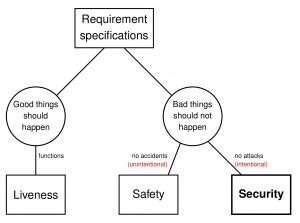Security is many things for many people. For a general, security is national security. For a child, security means that there are no bullies at school or in the computer. For a banker, security is a protected financial asset, structured so that the risks are minimized or tranferred to someone else. For a bee, security means that anyone who tries to steal honey will get bee’s sting, even if it costs her life. There are many different views of security.
The different views lead to a lot of confusion. A security strategy recommended to a child (e.g., “Do not escalate conflicts”) may not be accepted in national security, and may again be universally recommended for a workplace, even within a department of national security. Difficult problems of cyber security are often easily solved in everyday life, and the other way around.
Security is one of the three basic families of goals that we strive for every day. First of all, we split our goals into two families of requirements:
- that good things should happen, and
- that bad things should not happen.
And then there are two kinds of bad things, which we treat differently:
- natural hazards, and
- intentional attacks.
The requirement that good things should be guaranteed to eventually happen is called liveness. The requirement that we should be protected against natural hazards are called safety. The requirement that we should be protected against intentional attacks is called security. Here is a picture. (Click to enlarge.)
Let us look at some examples.
- The main function of a house is to provide a space for sleeping, a space for cooking, etc. These are its liveness properties. The door on the house protects us from natural hazards, and thus provides safety. The lock on the door protects us from thieves, and thus provides security.
- The main function of a car is to drive from place to place. A working engine is necessary for this liveness property. The brakes are necessary for safety, as they allow us to prevent some accidents. The alarm system is necessary for security, as it prevents theft.
- The main function of a text editing application is to let us edit text. Its liveness requires that it saves the changes that we make. Its safety requires that it does not crash or deadlock because of the software bugs left behind careless programmers, like buffer overflows, null pointers, etc. The security of a text editor requires that it does not let attackers take control of our data or computer. Note that a safety failure can cause a security failure: e.g., an attacker can use a buffer overflow to install malware.


